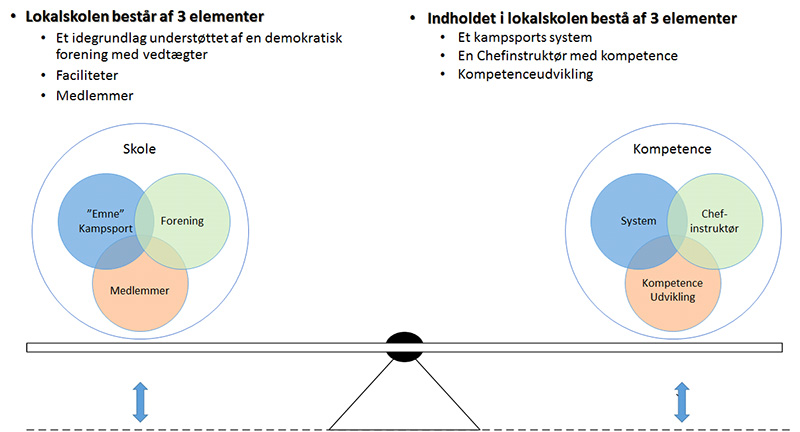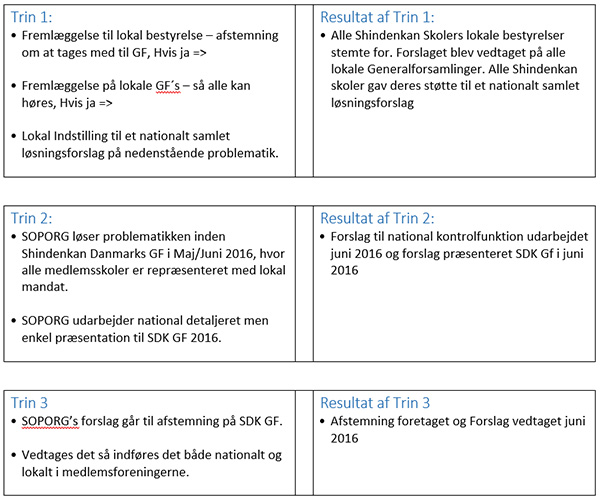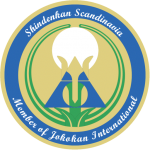At the request of all Shindenkan's member schools' representatives during the national general assembly in 2016, Shindenkan's SOPORG committee has launched a new large-scale initiative to meet the member schools' needs and wishes.
The digital age has made the world small and with all the continuous national competence activities, new friendships and networks are emerging across all the member schools. This means that the members cheerfully talk together and compare the different conditions in the local member associations. This is right in the spirit of Shindenkan and has led to a basic idea which has been linked to other needs, where Shindenkan can be "First Mover" in Denmark, Europe and Internationally.
As the only real neutral head instructor in Shindenkan, and in his role as head of Shindenkan's Competence and Development Center, Kimu Sensei has gathered all the threads and prepared a coherent concept. This new concept brings together all the improvement and change steps that have been rolled out since November 2015.
This combined and coherent concept tool must now be presented democratically in all the member-elected management layers from national to local level, where the general meetings are the highest authority in Shindenkan cf. the Association Act.
This article has the function of first information for all Shindenkan members, BEFORE the presentation at the local general meetings and boards, so that we can manage to adapt the concept tool with possible improvement proposals from the local general meetings, before the national general meetings.
All this will take place in the period from May to June, 2017. This article also has the purpose and function of being an inspiration for other democratic federations and associations in Denmark, Europe and internationally, as we have often been before and are. We are very proud that we have more than 1000 years of unbroken history in Japan and now also 50 years of history in Denmark, as one of the first and still existing martial arts systems established in Denmark and Europe.
Background
For almost 30 years, Shindenkan has developed exponentially through six very successful strategic plans with a focus on growth, education, standardization and adaptation to the modern communication platforms in several ways and levels. In the period 2004-2016, we have grown by more than 3,000 %! Throughout this period, Shindenkan has made a huge investment in developing chief instructors, Instructors and their skills so that all schools have a high standard level in Yakami Shinsei-Ryu karate-do and not least, a huge investment in preparing the next generation of Chief Instructors and instructors – with an associated investment both nationally and locally.
Betting and problematic
It is obvious to everyone in a local school, members as well as the board, that head instructors and instructors are the decisive supporting elements for the local school and that they are indispensable for both operation and development. In short - They are passionate and without them the local school would not exist.

After almost 30 years of intensive information, information and communication work locally and nationally, Shindenkan, like so many other federations and associations, was still faced with one particular problem. A problem that has always existed is that many of our incredibly well-educated instructors feel very bad about having to defend themselves to the members when they get or should get funding for their leadership courses, competency courses, curriculum standardization, etc.
All association leaders within all sports have felt the ingratitude at general meetings from members who could never dream of raising a finger for anyone but themselves. But who, in the name of democracy, feels entitled to point fingers at the voluntary and unpaid forces and dictate to them how to carry out their work, even though 99+% of the other members are extremely satisfied.
In a totally competency dependent organization where it takes at least 8-12+ years to train a qualified instructor to lead the entry level teams, it is a disaster for the local association to lose a young enthusiastic instructor who has been belittled and unappealingly vilified on the local general meeting of a mature man or woman, or group, which usually stops right after the general meeting, or shortly after is found in a competing association. In the name of democracy, this is, unfortunately, also part of everyday life in many associations with voluntary and unpaid forces, just as it is also in Shindenkan.
Isn't it about time someone answered the charges? We take that seriously at Shindenkan and that's why we also act.
At the same time, the local subsidy structures in the Shindenkan schools have been very uneven and opaque, as well as unclear in relation to the basis that triggers subsidies for leadership training in the local school.
Something had to be done about this! It is not intended that the main contributors, who are totally decisive for the existence of a Shindenkan school, should be an excuse for themselves.
This is not how we should treat Shindenkan leaders, who do a huge amount of voluntary and unpaid work constantly.
Analysis and understanding
In order to form an overall overview of the problems, Kimu Sensei put the subsidy structure on the agenda as a top priority at the leadership development seminar in November 2015 and it took a total of 4 days, working from morning to evening to gather the overview.
It quickly became very clear to Kimu Sensei that this ambiguity and lack of standardization would threaten the national Strat20 plan, and therefore Kimu Sensei took the initiative to create a uniform, nationally structured and transparent set of subsidy rules with up to 50 % self-payment part, and on what basis these can be given, - with the aim of making it the same for all Shindenkan schools. With information comes knowledge that can be acted upon.
Of course, depending on the individual Shindenkan school's finances and development, as an incentive for the contributors. You can't pluck a bald man's hair.
At the first leadership seminar in January 2016, Kimu Sensei presented a solution proposal to all the Chief Instructors, in his capacity as the only neutral and independent Chief Instructor in Shindenkan.
After another 5 days of working on the solution proposal, from morning to night, Kimu Sensei suggested that the Chief Instructors should refine the presentation and present it to their instructor teams and the local board.
Level
The presentation was named "Place for all, - Economy and financing according to effort" and a 3-step plan was launched to create consensus on creating a uniform standard model.
Process and Plan

Assignment:
After the presentation "Space for all, - Economy and financing after efforts" had been adopted at all local general meetings as well as at the national ones, the task went back to SOPORG, with the following 3 formulations:
- Prepare a nationally uniform budget and grant model that can be used by all Shindenkan schools.
- Develop a national control function so that all Shindenkan schools are controlled by a national body.
- Make an annual National audit and control of all Shindenkan Schools.
National audit March 2017
Just over a year after Kimu Sensei started the process, the annual national control function was to run for the first time in Shindenkan. The members of SOPORG were gathered at a leadership seminar over 4 days - to perform the National Shindenkan Control function.
National control function
The national control function in Shindenkan follows a fixed process of 5 steps and aims to ensure that the individual Shindenkan schools follow the rules for subsidies to the local leaders. The control function was performed in this way:
- Collect association accounts and bank statements from the last 5 years from each Shindenkan school.
- Choose three impartial SOPORG auditors per school so that no one revises himself!
- Carry out audit of the Shindenkan schools, including: Audit all income, expenses, incoming grants, outgoing grants and distribution in relation to value creation, including check:
- How much the individual head instructors have received in grants from the schools they are associated with.
- How much the individual head instructors have had from own payment.
- Are the subsidy and co-payment in line with the actual expenses.
- Have there been any irregularities in any of the schools. If there is, this must be reported to the local board, which must then decide what to do. The task of the national control committee is to check and audit according to GF17 committee rules, national statutes and guidelines, but cannot make local decisions, but only recommend and make a matter transparent to the local association board.
- Set up all the schools in a uniform template and compare.
- Kimu Sensei then, as the only impartial one, conducts an audit of all schools' grant accounts and budget model, which he has worked through and structured holistically with other strategic and tactical focus areas throughout his 14-day Easter holiday. After which he presents this to the entire control committee, SOPORG, Executive Committee and National Boards for approved recommendation for adoption or rejection by the local general meetings. Next is the national general assembly. If everything here is adopted, the tool, the structure and the process flow are automatically created for the year of the future. Same for everyone, standardized across the organization and transparent. Completely in accordance with the decisions of the local schools and the National General Assembly from 2016 and the task will thus be solved.
The collaboration
All figures and budgets were worked hard through the first 4 steps and we had a good collaboration where we worked quickly and efficiently, challenging all accounts and budgets. It took us 3 days before we were ready for step 5 – Kimu Sensei's unbiased review. As Kimu Sensei began his audit, it became clear to all of us and we were again reminded that he is used to lightning fast planning and execution of such accounts and audits - and we were challenged on every detail in all schools :-). And we had to go back to each Shindenkan school's accounts and take it one more time.
Execution
It was a really good experience - We had good cooperation, an atmosphere where we worked hard and helped each other - until the national control function was finished. Once again, it was a fantastic collaboration and a great atmosphere that had existed between Kimu Sensei and SOPORG during the entire leadership seminar and it was very educational. We all had the chance to show who we are, what our skills can be used for when creating value for Shindenkan's members - the Shindenkan way - mutual respect and acceptance and what is knowledge worth if it is not used.




